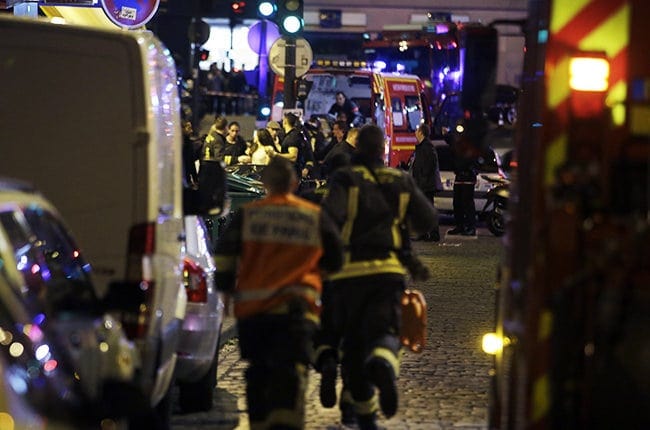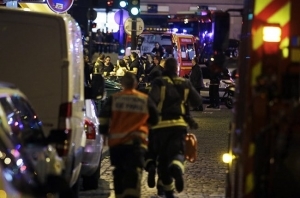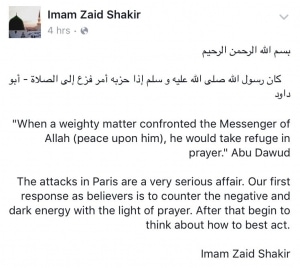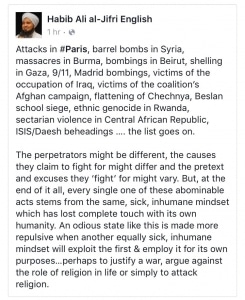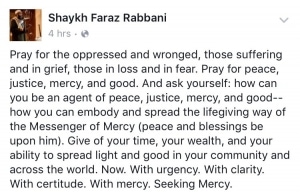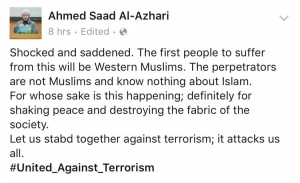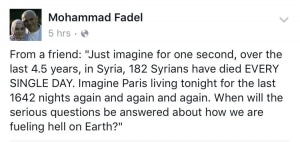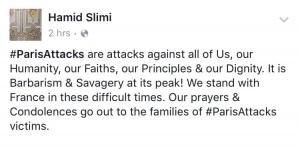Paris Attacks: Response and Responsibility

Assalamualaikum (peace be upon you), Bismillahir Rahmanir Raheem (in the name of God, Most Gracious, Most Merciful),
In the aftermath of the tragic attacks in Paris, France where so many have died senselessly, many Muslims feel very shaken. The believer is someone who is pained by the loss of others, who is saddened in the grief of others, who dislikes all that is odious to Allah. So the believer should be saddened, should be pained, should feel outrage at the wrong and should be praying for the families of those who died, should be praying for safety and good.
Don’t feel dejected
With that, one has to realize that the believer never feels dejected nor overwhelmed by the sheer force things. The believer takes everything back to their faith. We believe without a doubt that everything happens by the will of Allah and with the Wisdom in it. Nothing is outside of the will of Allah. Everything is in His hands, and we do not object to that.
You are not responsible
While saddened, don’t forget you’re not responsible for this. Did you do it? Did you support it? Did you agree with it? As a Muslim, you should not feel shaken, that “How come this happened?” None of us agree with it, none of us supported it, none of us see that this has anything whatsoever to do with the example of the beloved messenger, Muhammad, peace and blessings be upon him, the one who in battle was praying for his enemy, who after two decades of being attacked and ostracized and oppressed and wronged and ill-treated by his own people, forgave everyone upon entering Makkah victorious. He said, “May Allah forgive us and you. There’s no blame on you today.”
It’s not info-tainment
Our Messenger is a messenger of absolute mercy even in battle, with the highest standards of noble conduct in the most difficult and testing of situations. Don’t feel somehow embarrassed. [What happened in Paris] has nothing to do with you as a Muslim. It has nothing to do with your belief in Allah. It has nothing to do with your religion. It has nothing to do with your Prophet (peace be upon him) nor what he has come with, so that’s not what should consume us nor should we just sit back and make this a mode of info-tainment. “What’s the death count now?” or “Oh, 150 people have died” or “Oh there’s X number of attacks” or “Oh look there’s a dead woman!”
You have a responsiblity
There is a tragic loss but along with being saddened and feeling grief for those who have lost, realising you’re not responsible for what took place, we do have a responsibility as believers. Our responsibility as believers is not fulfilled by sitting back and watching what is going on and feeling dejected by it or being defensive about it but rather, Allah, Most High, has made us responsible for protecting the good and standing up to the wrong.
Don’t sit back and watch
“You are the most virtuous of communities raised on to humanity. Call to all that is good. Forbid all that is wrong,” so when we see ugliness being spread in the name of our religion, there are travesties and terror being committed in the name of our Prophet (peace be upon him), we have to realize that we have a collective responsibility. Instead of sitting and watching the news for hours, ask yourselves – “How can I be a part of change for the good? Are there religious understandings in our community that are ugly, that are affecting our youth and causing them to embrace erroneous ways?”
A counter-narrative
There are. Those understandings have nothing to do with the way of the messenger of mercy but we are responsible for having a positive counter-narrative. What is the counter narrative? It is the way of light, the way of the beloved messenger, peace be upon him, who is an embodiment of Mercy. The way we deal with harshness is mercy. The way we deal with ugliness is beauty. The way we deal with darkness is light.
Dedicate your life
We have to ask ourselves, what am I doing to be part of the way of light, the way of Mercy, the way of beauty in this life? We should all be asking ourselves how many hours we give of our days and weeks and months and years in serving the religious good, calling people to the beauty, mercy and virtue of the way of the Prophet (peace be upon him). How much of our time do we spend being agents of mercy?
Prophetic concern
Our messenger is the one who while on an important expedition as the Messenger of Allah, stopped to attend to the concerns of a deer. That’s the nature of prophetic concern. The Prophet (peace be upon him) cared for the concerns of animals, let alone human beings so what part of the good are you dedicating yourself to? That’s what we have to ask ourselves.
How can you direct your time towards the good? How can you direct your life towards the good? How can you direct some of your time to be of assistance to others? In these times, call yourself to Allah. Commit yourself to reconnect with virtue.
Heal and be healed
Yes, there may be other people, who are causing damage all around in the world but many of us are causing damage in our own marriages, in our own families, to our own children, to our own parents, in our own communities, in our own relationships. We need to heal and be part of the healing because this is what the Messenger (peace be upon him) has come with.
Urgency
When we see ugliness, we should have a renewed sense of urgency to uphold the good ourselves, to become embodiments of the good, to become ambassadors of the good, to become callers to that good so find something of the good that you are connected with on a weekly basis in your personal life. Connect with knowledge, connect with spirituality, connect with service and have something that you do on a weekly basis that benefits others so that you serve to become an agent of the good. Renew that commitment and when you see events that are ugly, have a sense of urgency. If you’re not able to do good yourself, support the causes that are doing good. The ways of good are many – actively support them with your time but also with your wealth, your skills and with all that you have.
May Allah Most High make us of those who spread light when we see darkness, who spread good when we see evil and who are part of healing and mercy because that is the way of our beloved messenger, peace be upon him, and have no doubt whatsoever about that.
Shaykh Faraz Rabbani
13 November 2015
Is ISIS justified in its ritual slaughter of enemies?
Shaykh Faraz Rabbani addresses a question asked at a session in SeekersHub Toronto, “Is ISIS justified in its ritual slaughter of its enemies and its burning of prisoners and others on the basis of prophetic teachings, specifically in regards to the hadith where the Prophet (saw) is reported to have said, O Quraysh, I have come to you with slaughter?” Catch his brilliant and comprehensive response on the SeekersHub Podcast or watch it below.
Podcast:
![]() Shaykh Faraz Rabbani was asked “According to a commentary I read on Hadith 13 (None of you [truly] believes until he wishes for his brother what he wishes for himself.] – this hadith is very broad and includes Non-Muslims. Should we then consider Non-Muslims to be our brothers and sisters?”
Shaykh Faraz Rabbani was asked “According to a commentary I read on Hadith 13 (None of you [truly] believes until he wishes for his brother what he wishes for himself.] – this hadith is very broad and includes Non-Muslims. Should we then consider Non-Muslims to be our brothers and sisters?”
The question came from Shaykh Faraz’ class on Imam Nawwawi’s 40 hadith – take the course for free today. Listen to the answer: Are Non-Muslims Our Brothers, as Mentioned in the Hadith?
Reactions on social media worth reading:
Resources for Seekers:
- Paris Attacks: Response and Responsibility
- Afraid to get groceries? On being a woman in turbulent times
- “Be Unapologetically Muslim No Matter What”
- Finding Safety and Solace in the Sunnah
- “Our hearts are with all who are suffering in California”
- What Is the Meaning of the Hadith “Ruined Are the Extremists”?
- ISIS, Sex Slaves and Islam – reflections from Imam Zaid Shakir
- Helping our children find the light in dark times
- The threat to religious guidance
- “Peace is always in the middle, never at the extremes”
- Fatwa Against Terrorism and the Targeting Of Civilians
- Khawarij Ideology, ISIS Savagery
- Humanity before Religiosity
- On War & Beheading: How ISIS Manipulates Hadiths
- This is not the path to paradise, advice from Shaykh Abdullah bin Bayyah
- Injustice Cannot Defeat Injustice
- On the mass murder of Coptic Christians by ISIS
- Islam vs. ISIS: A Letter to Baghdadi from Leading Scholars
- Clarity in Crisis: How Believers Look at Trials and How they Respond, Guided by Prophetic Light
- Striking Necks: It Must Be the Kharijites!
- Anger, Restraint, Wisdom and the Prophetic Message in Our Times
- Explaining the Chapel Hill shooting to children
- Six Reasons Why the Fort Hood Killings by Nidal Hasan Are Clearly Impermissible (Haram) in Islamic Law
- Help Us End Extremism and “Ugly Islam”
